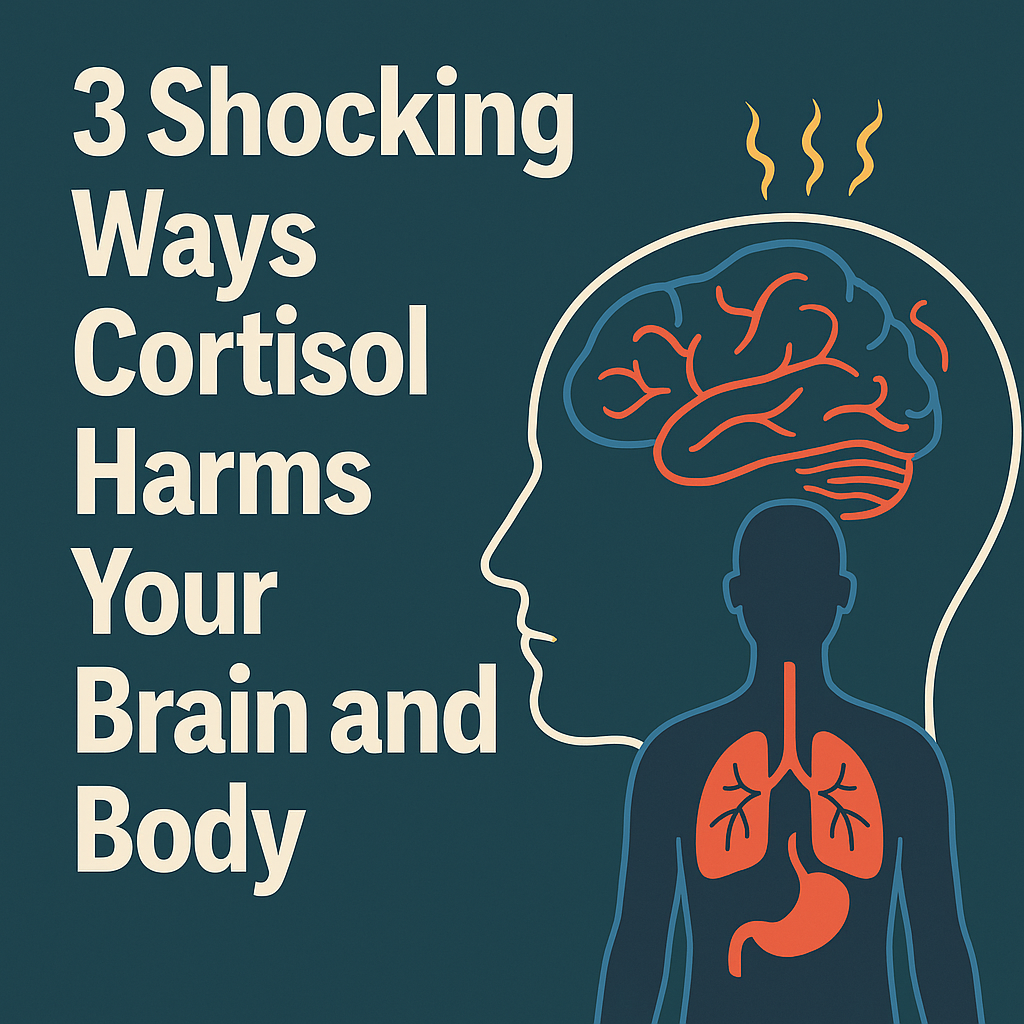
Cortisol: 7 Powerful Truths About Its Dangerous Impact on Your Brain and Body
In today’s fast-paced world, understanding how our body responds to stress is more important than ever. At the center of this response lies a hormone called cortisol. Known as the “stress hormone,” cortisol plays a vital role in many physiological functions. However, when imbalanced, it can wreak havoc on your mental and physical health.
In this blog, we explore what cortisol is, how it works, its impact on the brain and body, and how you can manage it to protect your overall well-being.
Understanding Stress Hormone: The Body’s Alarm System
Cortisol is a steroid hormone produced by the adrenal glands, located on top of your kidneys. It is a key component of the hypothalamic-pituitary-adrenal (HPA) axis—a central stress response system. It is released in response to stress or low blood glucose and helps your body maintain homeostasis.
It’s functions like an internal alarm system. When you encounter a stressor—be it physical danger, work pressure, or emotional turmoil—your body enters a “fight or flight” mode. Cortisol floods your bloodstream, temporarily increasing blood sugar, enhancing brain function, and suppressing non-essential systems like digestion and immunity.
While this response is beneficial in short bursts, chronic elevation of cortisol is where the trouble begins.
How Stress Hormone Affects the Brain
1. Memory and Learning
Short-term cortisol can boost brain performance by sharpening focus. But when it’s levels remain high for long periods, it starts affecting areas like the hippocampus—the brain’s center for memory and learning. Chronic stress and high stress hormone are linked to poor memory, difficulty concentrating, and slower cognitive processing.
2. Mood and Emotional Regulation
It heavily influences the amygdala, the brain’s emotional processing center. Prolonged high levels can make individuals more prone to anxiety, irritability, and depression. Over time, people may also develop emotional numbness or mood disorders.
3. Sleep Disruption
Stress hormone follows a diurnal pattern—naturally peaking in the morning and dropping at night. But chronic stress disrupts this rhythm, making it hard to fall or stay asleep. This insomnia then feeds back into cortisol imbalance, creating a damaging loop.
The Effect of Stress Hormone on the Body
1. Immune Suppression
Itl is anti-inflammatory, which sounds like a good thing. However, excessive levels can weaken the immune system over time, making the body more susceptible to infections and slowing down recovery from illness.
2. Weight Gain and Fat Storage
One of the most visible effects of high stress hormone is weight gain—especially around the abdomen. It increases appetite and cravings for sugar and fat, leading to overeating and unhealthy fat accumulation. It also alters how your body stores fat, making it harder to lose.
3. Hormonal Imbalance and Fertility Issues
It disrupts the production of sex hormones like estrogen and testosterone. For women, this can lead to irregular periods or infertility. In men, high stress hormone can reduce libido and sperm production.
4. Heart and Blood Pressure Problems
Chronically high stress hormone can increase blood pressure and cholesterol, leading to heart disease over time. It also raises blood sugar, increasing the risk of type 2 diabetes.
What Causes Cortisol Imbalance?
Several factors can disrupt it’s production:
- Chronic psychological stress (e.g., work, relationships, trauma)
- Sleep deprivation
- Poor diet high in sugar and caffeine
- Lack of physical activity
- Underlying health issues such as Cushing’s syndrome or adrenal fatigue
Even constantly checking emails, social media, and handling multiple responsibilities can keep cortisol elevated.
Signs of High Cortisol Levels
If you experience the following symptoms frequently, your cortisol levels may be too high:
- Trouble sleeping or insomnia
- Frequent headaches
- Mood swings or anxiety
- Fatigue, even after rest
- Increased belly fat
- High blood pressure
- Weakened immunity
- Brain fog and forgetfulness
It’s important to consult a healthcare professional for a cortisol test if you notice these signs.
How to Naturally Manage
1. Practice Mindfulness and Meditation
Mindfulness techniques, including meditation and deep breathing, have been shown to reduce cortisol levels significantly. Just 10–15 minutes a day can help shift your body from a stress response to a calm state.
2. Get Quality Sleep
Prioritize sleep hygiene—keep consistent bedtimes, reduce screen time, and create a calming nighttime routine. Sleep is one of the most powerful regulators of cortisol.
3. Exercise Regularly, but Don’t Overdo It
Moderate exercise helps reduce cortisol and increase mood-boosting chemicals like endorphins. However, excessive high-intensity workouts can actually increase cortisol, so balance is key.
4. Eat a Balanced Diet
Avoid processed foods, caffeine, and high sugar intake. Instead, opt for complex carbs, lean proteins, and healthy fats. Foods rich in omega-3s, magnesium, and vitamin C support cortisol regulation.
5. Build Emotional Resilience
Journaling, therapy, and maintaining social connections help process emotions, reducing the long-term effects of psychological stress.
When to Seek Medical Help
If lifestyle changes aren’t enough, or if symptoms worsen, it’s essential to seek medical help. An endocrinologist can run blood or saliva tests to assess cortisol levels and determine whether there’s an underlying issue such as adrenal gland disorders.
Final Thoughts: Balance Is the Key
Stres hormone isn’t inherently bad—in fact, it’s essential for our survival. The problem lies in chronic cortisol elevation, which turns a helpful hormone into a silent saboteur of health.
Understanding how itl affects your brain and body can empower you to make lifestyle changes that promote balance, well-being, and mental clarity. With the right tools and awareness, you can stop stress from controlling your life and restore harmony in both your body and mind.

